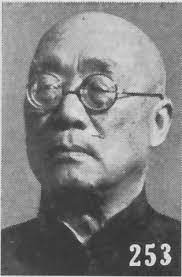Tung K'ang (16 April 1867-1947), leading authority on Chinese law and jurisprudence who served as a cabinet minister and as chief justice of the Supreme Court at Peking during the Peiyang period. He also was known as a scholar of early Chinese drama who contributed a number of special collections of rare works to the available literature on the subject. A native of Wuchin, Kiangsu, Tung K'ang studied as a youth at the Nan-ching Academy in Chiangyin where he took particular interest in traditional Chinese literature. In 1889 he became a chü-jen and in the next year a chinshih, which led to his immediate appointment as a junior official in the Board of Punishments. During the Boxer Uprising, he was an assistant secretary in the same board, taking charge of judicial affairs for Shensi province. After the entry of the Allied forces into Peking and at the request of civic leaders in the southern quarter of the capital, he helped establish the Hsiehhsün kung-so [patrol authority], which did much to maintain order. In recognition of the patrol's accomplishments, the occupation forces soon returned its full administrative authority to Chinese officials of the Board of Punishments. Tung K'ang was subsequently promoted to be chief warden of the prison of the Board of Punishments and a judge of the Supreme Court, and he was one of the officials who supervised the executions of Ch'i-hsiu (ECCP, I, 407) and Hsu Ch'eng-yü (ECCP, I, 408) on 26 February 1901.
After the death of his mother in 1902, Tung K'ang remained at home beyond the required mourning period. However, upon his subsequent return to Peking, he became the editor in chief of the law codification bureau. In close cooperation with another Nan-ching graduate, Wang Jung-pao, he completed a new code which was promulgated by the Ch'ing government after being approved by the National Assembly.
Tung K'ang served briefly as minister of finance in 1912 but was obliged to resign his post and leave for a tour of Europe, the United States, and Japan when he incurred the displeasure of Tuan Ch'i-jui (q.v.) and his followers for looking too closely into the foreign loans which had been floated by Tuan. After returning to China, Tung K'ang served as chief justice of the Supreme Court from 1914 to 1918, president of the law codification bureau in 1918, and minister ofjustice in 1920. Near the end of 1926 the feud between Tung K'ang and Tuan Ch'i-jui again came into the open. Tuan induced Sun Ch'uan-fang and Chang Tsung-ch'ang (qq.v.), military governors of Kiangsu and Shantung respectively, to order Tung's arrest. Tung fled to Japan, where he stayed until April 1927. Prior to this episode, as a distinguished authority on Chinese law, Tung K'ang had received in 1925 an honorary degree of LL.D. from Soochow University Law School in Shanghai and had served as a professor there in 1926. After his return from Japan to Shanghai in 1927, he practiced law and headed a technical school for training judicial officers which was known as the Shanghai fa-hsueh-yuan. Tung visited Japan during 1934 and 1935 to lecture on the history of law. After the Sino-Japanese war began in 1937, he took an active part in the Japanese-sponsored government at Peiping as chairman of the judicial court, chairman of the judicial committee, and chief justice of the supreme court. Tung's postwar career is obscure, but it is likely that he was taken into custody because of his collaboration. He died in 1947. In addition to being a lawyer and an official, Tung K'ang was a scholar of early Chinese drama who contributed a number of special collections of rare works to the available literature on the subject. These include both photolithographical reproductions of the collections Tsa-chil shih-tuan-chin, by Chu Yu-tan (d. 1439) ; Su-men hsiao, by Fu Ch'ing-mei; and Mao Hsi-ho lun-ting hsi-hsiang-chi, a critical study of the Hsi-hsiang-chi [romance of the western chamber], by Mao Ch'i-ling (ECCP, I, 563-65) ; as well as editions of old plays prepared by Tung himself: Shih-ch'ao cKuan-cKi ssu-chung, containing the texts of the four extant plays of Juan Tach'eng (ECCP, I, 398-99), and Sheng-ming tsa-chü, a collection of dramas written by the leading playwrights of the Ming and early Ch'ing periods. Tung also edited the Ch'ü-hai tsung-mu Ci-yao, a descriptive catalogue of 684 titles of dramas written during the Yuan, Ming, and early Ch'ing periods, originally compiled by Huang Wen-yang (fl. 1780), and the Sung-fen-Vang ts'ung-k'an, a collectanea of the most important texts and critical works relating to traditional drama.
T'ang was an aesthete and a perfectionist, noted for his collections of stone monuments, rubbings, and ancient coins. He was a congenial man, and, despite his wartime associations with the Japanese, retained the nickname of Tung Sheng-jen or "Tung the Sage" to the end of his life. Tung Pi-wu £& ft

董康
字:绶经
号:诵芬主人
董康(1867.4.16—1947),中国法律、司法界权威人士,北洋政府时曾在北京任内阁总长、大理院长。他以现有有关书籍中汇编早期曲剧珍本享有学术上的声望。
董康,江苏武进人,青年时在江阴南菁书院读书,专注于中国古典文学。1889年中举人,翌年成进士,授刑部主事。义和团时,授刑部郎中,主理陕西刑事案件。联军进北京后,他应北京城南士绅之请,设巡阅公所维持治安。鉴
于该所的成就,占领军不久就将全部行政权力归还刑部中国官员。后授刑部典簿,大理院推丞,于1901年2月26日参与监斩启秀、徐承煜。
1902年,董康的母亲去世,他居家守丧逾期。不久回京,授法律馆编修。他和南菁的同学汪荣宝编修了一部新法律,经议会通过后由清廷颁布。
1912年,董一度任财政总长,后因追査借款事宜过严与段祺瑞不和辞职去欧美日本游历。回国后,于1914—1918年任大理院院长,1918年任法制编纂馆馆长,1920年任司法总长。
1926年底,董康与段祺瑞的矛盾又一次公开化了。段下令江苏督军孙传芳,山东督军张宗昌逮捕董康,董逃往日本,一直到1927年4月。在此之前,作为中国法律界的一个著名权威,他于1925年得到过上海东吴大学法学院的名
誉法学博士学位,1926年并任该院教授,1927年董由日本回到上海后,在上海开业做律师,并主持了一所训练法官的专业学校上海法学院。1934年、1935年曾去日本讲法学史,1937年中日战争开始后,他在北平的日伪政府中很活跃,任法院院长,司法委员会委员长,大理院首席法官。战后,他的情况不详,可能因投靠日本而被监禁。他死在1947年。
董康除了做过律师和法官外,又是一个研究中国古代戏剧的学者,从事汇集古代曲剧珍本,影印了朱有敦(死于1439年)的《杂剧十段锦》,毛西河评点的《西厢记》,此外又编印了阮大成仅存的《石巢传奇四种》,《盛明杂剧》,该书是明代和清初一些著名戏剧家所写剧本汇集。还编印了《曲海总目提要》,包括元明及清初各种剧曲684种的详细目录,该书初稿是黄文洋于1780年编集的,他还著有《诵芬堂丛刊》,收录了一些重要戏曲的唱本和评论文章。
他还是一名古董鉴赏家,喜欢收藏石刻、碑帖、古钱。他是一个很随和的人,虽在战时同日本人合作,但至死仍被人称之为“董圣人”。